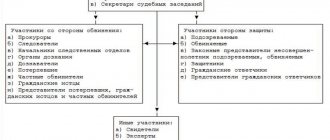( 11 votes, average rating: 4.82 out of 5)
lawyer Other
Every person living on the territory of the Russian Federation is guaranteed the right to protection of honor and dignity. Therefore, a person who insults or humiliates another person can be held accountable. But many people do not know this and allow others to abuse them and violate their guaranteed rights. However, if the victim contacts government agencies, authorized persons will take measures to restore the violated rights and bring the violator to justice.
Insult and its forms
Every person has faced insult more than once, but only a few defend their rights, the rest simply tolerate it and take no action. Ignoring such an offense can lead to it being committed systematically. So neighbors, colleagues, employers and other people around us can cross the line and exert constant psychological pressure, and this leads to mental problems, damage to reputation and trust. Therefore, violations of the rights to honor and dignity must not be allowed, and if someone has violated them, then he must be immediately brought to justice. Before applying for protection from government agencies, a person should make sure that the person’s actions can be regarded as illegal. Thus, acts that are aimed at humiliating the honor and dignity of a person and are expressed in a rude form are recognized as an insult. Insult is expressed both in written and oral form. In addition, it also includes indecent gestures and movements.
This offense includes the following:
- A rude statement towards a person that humiliates his honor and dignity (obscene language, comparison with animals and objects, etc.) - both “live” and on the Internet
- Inscriptions on buildings, drawings, messages, posts on social networks, letters, etc.
- Offensive movements (pushing, pouring, touching, gestures, etc.).
It does not matter whether the addressee was present or not at the time the offense was committed, even if it was committed in his absence (or if the letter was sent to another person), the act will be considered illegal. And if there is evidence and witnesses, the violator can be brought to justice.
Slander
Slander means deliberately false information disseminated by the defendant intentionally. For such an offense, criminal liability is provided under Article 129 of the Criminal Code of the Russian Federation. May be distributed publicly. If, in addition to false information, accusations of committing a crime (grave/especially grave) that are not true are circulated, the defendant’s punishment will be increased. What you can get:
- fine 80 thousand rubles/income for six months/compulsory work up to 240 hours/correctional labor up to 6 months/restriction of freedom up to 12 months;
- for public libel, a fine of 120 thousand rubles/income for six months/compulsory work for up to 180 hours/correctional labor for up to 24 months/restriction of freedom for up to 24 months/arrest for up to six months;
- for accusations of a crime, a fine of up to 300 thousand rubles/salary for up to 2 years/restriction of freedom for up to 36 months/arrest for six months/imprisonment for 3 years.
One of the above measures may be applied to a person found guilty.
What liability awaits the violator?
An offender can be held accountable only if he has reached the legal age and was sane at the time of committing the offense.
If he is recognized as the subject of an offense, then for such an act he can be brought to:
- Administrative responsibility.
- Civil liability.
- Criminal liability.
The type of punishment depends on the objective side of the offense.
Administrative responsibility
For a “simple” insult that was committed against a civilian, the offender is brought to administrative responsibility (5.61 Code of Administrative Offenses of the Russian Federation) . A preventive measure is a fine, the amount of which depends on the type of entity (individual or legal entity) and the nature of the violation. So the minimum fine for an individual is 1,000 rubles , and the maximum is 3,000 rubles . If this is an official, then the fine is from 10 to 30 thousand rubles . For an organization – from 50 to 100 thousand rubles. If the insult was committed with the help of the media, then a fine is imposed on the head of the organization through which the information was disseminated.
Important!
Also, do not forget that the victim has the right to file a civil lawsuit against the person who insulted him and make a claim for compensation for moral damage
Let's summarize the penalties:
- Individual – from 1 to 3 thousand rubles
- Official - from 10 to 30 thousand rubles
- Legal entity - from 50 to 100 thousand rubles
Criminal liability
If an unlawful act was committed against a civil servant at the time he was fulfilling his official obligations, then the offender will be brought to criminal liability (336 of the Criminal Code of the Russian Federation) . For insulting a person, a fine is imposed ( up to 40,000 rubles ) or correctional labor is imposed for up to 1 year.
And in addition to this, the victim can also recover from the violator the moral damage that he suffered as a result of humiliation.
The violator can be brought to two types of liability at once : administrative (criminal) and civil.
In order for a person to be punished, the victim must file a complaint with the relevant authorities: the police, the prosecutor's office or the court. Since the elements of this offense relate to a private type of accusation and without a statement the case is not considered, even if the insult was public.
Interesting!
At the moment, a proposal has been made aimed at tightening sanctions for insult (they will immediately increase several times)
Moral injury
The difficulty of proving moral damage is as follows:
- each person can react differently to the same words (the offender may not even be aware that he is insulting his interlocutor with this action and/or expression);
- an insult can humiliate a person, although witnesses, due to ignorance of certain circumstances, may not understand that the statement is precisely an insult.
Speech expressed in the form of suspicion will not be an insult. For example, the assumption that a person is a thief and a direct statement (I think he stole and you are a thief) are two different things. Actions considered an insult:
- the offense is directed towards a specific person and/or a specific group of persons);
- interethnic quarrels and insults provoked by nationality and/or ethnicity will be considered under another article;
- the insult does not affect the person’s qualities (for example, he works poorly), but his personality. The degree of moral damage is determined by the magistrate, however, in order to apply for protection of rights, you do not need to write a statement of claim.
It will be enough to contact the prosecutor's office. The following may act as defendants in such proceedings:
- the one who directly offended;
- the one who leaked the information to the media.
The following is used as evidence:
- witness's testimonies;
- audio/video recordings;
- certificates and other documents directly related to the trial.
Do not forget about paying the state fee; the judge will not initiate legal proceedings without paying the required tax. The amount to be paid is 200 rubles. But before filing a claim, you will need to take the details for transferring funds and clarify the amount of the state duty, since our laws are often amended. The applicant himself must ensure the attendance of witnesses in the courtroom. The amount is determined by the victim himself - how much he wants to receive for the moral damage caused. But in fact, only a judge can decide how much the person who was insulted will receive, having studied all the circumstances of the case. And provided that the guilt of the accused is proven.
How to prosecute for personal insult?
Let us examine in detail the procedure for bringing to justice for insults on the Internet, at work, etc. in 2022. At the moment of insult, a person should remain calm. Under no circumstances should you insult the offender in response, since then bringing him to justice will be more difficult or even impossible. You should contact government agencies immediately, this will make it much easier to prove the fact of humiliation and insult. In order for authorized persons to accept the case for consideration, the victim must submit a written application, drawn up in accordance with the requirements of the law.
The application is written in an official business style; it should not have any blots or corrections. The application must indicate: the name of the body to which it is submitted; information about the victim and the offender; description of the moment the offense was committed; description of the consequences resulting from the violation of rights guaranteed by law; list of requirements. Also, the application must indicate the date of its submission and the signature of the victim. A sample application can be obtained from the office of a government agency. All available evidence should be attached to the application (copies should be attached, only if necessary, provide the originals), since without them it will be very difficult to prove the guilt of the offender. Anything can be used as evidence: screenshots of insults on social networks, video or audio recordings of verbal insults, photographs, witness statements, expert opinions, etc. The main thing is that the evidence meets these 3 requirements :
- Relevance. The evidence must be relevant to the particular case.
- Acceptability. All evidence must be obtained only in a legal manner, otherwise it is not taken into account when considering the case.
- Credibility. Evidence must not be fake. There is criminal liability for providing counterfeits and misleading authorized persons.
In addition to evidence, you must attach a copy of your identification documents (passport) to your application. Since without them a written request will not be accepted. The application is submitted to the office of the government agency; if there are errors in the design or other shortcomings, it will be returned for revision. If no errors were identified, then the application is accepted and a stamp of the institution is placed on one of its copies, or a coupon is issued indicating the date of acceptance. The applicant must have either one copy of the application or a coupon. Since if no measures are taken by government officials, the applicant will be able to file a complaint with a higher authority about the inaction. Since they are obliged to consider the case and take action within the period prescribed by law. The government agency employee must notify the applicant about the results of the investigation and the measures taken.
Unfortunately, almost every person has encountered such a phenomenon as insult. Many are even accustomed to being insulted and humiliated and simply do not react to it. However, as long as people allow their rights to be violated, this will continue. It is possible to reduce the level of such offenses only if every person shows an active civic position and does not ignore insults, humiliation and other violations of his rights.
Video on the topic:
Social media
Previously, insults inflicted through social networks or other Internet resources (websites, portals, etc.) were considered public. At the moment, this does not occur in judicial practice, although such information is publicly available.
Modern Russian legislation does not define insults on the Internet as public, with the exception of official media sources (there must be registration). For example, someone wrote on the wall in Contact that Sidorov V.N. a bad person (in an obscene form) is not a public insult. But if the same words are written on the page of an officially registered media source on the Internet, then the punishment will be the same as for public insult. The process of proving the guilt of a defendant who insulted a plaintiff through a social network is more complicated. After all, you can delete messages almost instantly. There is only one way out in such a situation - to make a printout of the correspondence and have it certified by a notary. Moreover, not every notary will take on such a matter. In addition, it is necessary to prove that sitting on the other side of the monitor was the person on whose behalf the obscene and insulting expressions were written towards the plaintiff. After all, accounts are often hacked and unknown people write whatever they want on someone else’s behalf. Or, for example, a brother used his sister’s computer. Or you can film the correspondence process. The best option is the presence of witnesses in addition to all available evidence.
Degradation at work
When carrying out labor activities, citizens may also be subjected to humiliation and discrimination on the grounds of race, social status, nationality, religious and other beliefs.
At the same time, it is possible to accuse a person who committed the above acts only if a significant group of people was humiliated and this was done publicly, including through the media.
Otherwise, an act that degrades a person’s dignity will be considered under Article 130 of the Criminal Code of the Russian Federation.







